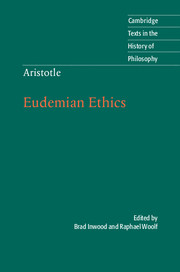Introduction
Published online by Cambridge University Press: 05 February 2013
Summary
The opening line of the Nicomachean Ethics introduces one of Aristotle’s best-known contributions to philosophy: ‘Every skill and every enquiry, and similarly every action and rational choice, is thought to aim at some good.’ This captures an inspiring and optimistic view of human nature, as does the equally famous opening of the Metaphysics, ‘All human beings by nature desire to know.’ Striving for the good and striving for knowledge are two of the key elements of Aristotle’s profound view of what is significant in the life of human beings. Less well known is the emphasis Aristotle places on the role of pleasure, healthy pleasure at least, in a good human life. And that view is featured in the opening sentences of his other major work on happiness and successful human living, the Eudemian Ethics. Aristotle criticizes the wise old poet Theognis for driving a wedge between what is pleasant and what is fine and good. ‘We should not agree with him. For happiness, being finest and best, is the most pleasant of all things.’
Aristotle’s unexpected focus on the pleasantness of the happy life is just one of the many significant, though often subtle, differences between Aristotle’s two authoritative books on ethics, distinguished since antiquity by the epithets ‘Nicomachean’ and ‘Eudemian’. These labels allude to his son Nicomachus and his famous student Eudemus of Rhodes. The reason why these two labels were chosen to designate Aristotle’s two works on ethics, Aristotle’s motivation for writing two different books on the topic, and the relationships between them are all issues mired in uncertainty and controversy. Each of these questions demands proper discussion, but at the outset we want to draw attention to some important basic facts about Aristotle’s Eudemian Ethics which make it eminently worth reading and indeed studying with as much care and attention as we routinely devote to the Nicomachean Ethics. First and foremost, it is important to recognize that the Eudemian Ethics is a complete treatment of happiness and the good human life, and in our view it was probably the first one Aristotle wrote. And if this is so, then it clearly demands our attention as a discussion of fundamental human values written by one of the great philosophers of the western tradition. But the nature of the work has been controversial, and so we should begin with a bit of background.
- Type
- Chapter
- Information
- Aristotle: Eudemian Ethics , pp. vii - xxivPublisher: Cambridge University PressPrint publication year: 2012



